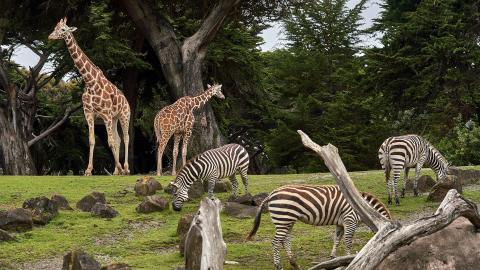- Zoos present a dilemma. On the one hand, they benefit conservation and research; on the other hand, placing animals (particularly intelligent ones) in captivity is ethically questionable.
- The more we learn about animals — especially how advanced or intelligent they are — the louder the debate will grow surrounding their captivity.
- Could zoos of the future feature realistic robots in place of animals?
In 1842, the Zoological Society of London opened up the doors to London Zoo to a very special guest: Queen Victoria. London Zoo is the oldest scientific zoo in the world, and the Zoological Society was anxious to see what the most powerful person in the world was to make of their rhinos, elephants, and quaggas (a species of zebra, now extinct). It did not go well.
While most of the tour went swimmingly, it all turned sour when Queen Victoria saw Jenny, the orangutan. This huge and hulking beast, one of the most intelligent of the primates, was the first of its kind to be seen in Europe. As Victoria saw Jenny’s deliberate movements and her remarkable range of expressions, the Queen found her “frightful, painfully, disagreeably human.” Victoria was quite okay to see herd animals and tiny critters, but the prospect of large, intelligent life caged up for her amusement? She was not amused.
The argument against zoos
Queen Victoria’s qualms are not uncommon. Zoos make many of us uneasy. No matter how shiny a ribbon we put on it, ultimately we go to the zoo to derive pleasure from the captivity of animals that were never meant to be behind bars. No matter how large a lion’s enclosure, how regularly the penguins are fed, or how attentively a sick giraffe is tended, the fact is that we go to zoos to enjoy the show animals provide us. We reduce them to objects for our enjoyment.
It seems that most people only go to the zoo because it’s a fun day out — sort of like an amusement park, except the animals are real rather than teenagers in giant costumes. Few seem to go for a truly educational experience. Instead, they gawp and point.
Philosophers such as Aristotle and David Hume long argued what modern science needed very little effort to prove: animals think and feel. Monkeys experience pain, wallabies nurture their young, and stoats can lay traps for their prey. There is intelligence, sentience, and emotion in the animal world. Is it ethical to lock up creatures like this?
The argument for zoos
However, most zoos today, especially in the developed world, function as massive, well-funded centers for research. Furthermore, they do educate and inspire generations of new conservationists and zoologists, even if that’s a small minority of the customers who attend.
Zoos also do their best to minimize the pain and death of their animals, a rather tangible benefit that these animals would not receive in the wild. In a zoo, a zebra gets hay on the menu; in the wild, the zebra itself is on the menu. Maybe captivity isn’t so bad, after all.
The biggest and most reputable zoos and aquariums in the world collectively fund over 2500 conservation projects across more than 100 countries to the tune of $160 million, providing experts with the cash they need to do their work. It would be naïve to suggest that the sheer scale of this could be matched by public service announcements or well produced viral videos, alone. In this light, could zoos be seen as the lesser of two evils — a form of collateral damage for the greater good?
This same logic applies to the repulsive idea of trophy hunting. While most of us are horrified, is it not objectively true that if some rich guy pays hundreds of thousands of dollars to a lion conservation project, would that not save far more lions in the long run than the one lion he goes on to shoot?
Robot zoos
The issue that we are faced with today is the same one that Queen Victoria called out in 1842. The more we learn about animal intelligence, the worse we feel about keeping them in zoos. This is particularly true for mammals like primates, dolphins, and whales.
There may be a solution. A company in California created a robot dolphin so realistic that visitors did not know they were watching a robot. (See video above.) Could something like this keep the upside of zoos while eliminating the downside?
Jonny Thomson teaches philosophy in Oxford. He runs a popular Instagram account called Mini Philosophy (@philosophyminis). His first book is Mini Philosophy: A Small Book of Big Ideas.






